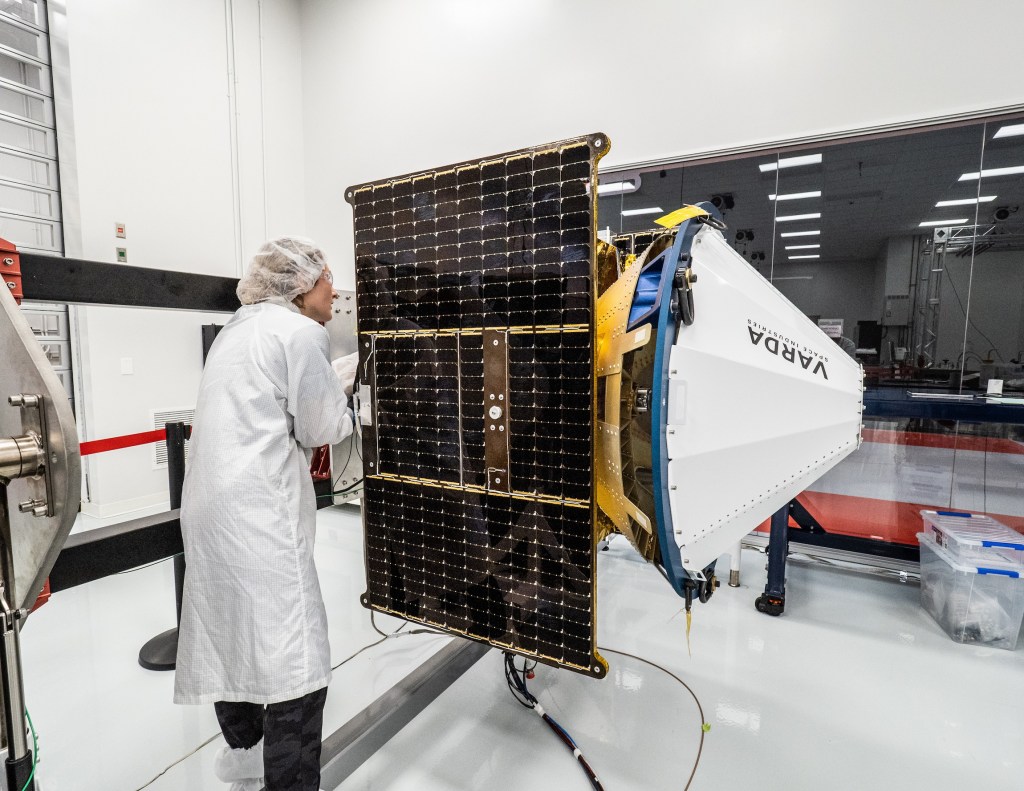The U.S. Air Force denied a recent request from Varda Space Industries to land its capsule at a Utah training area, pushing back the startup’s plans to show off the fruits of its in-space manufacturing, TechCrunch has learned. The company’s application for a commercial space license was also denied by the U.S. Federal Aviation Administration, an FAA spokesperson said.
Varda originally planned to bring back a capsule containing crystals of ritonavir, a drug used to treat HIV, in mid-July. After announcing that had been delayed, the company was looking at September 5 and 7, a source told TechCrunch. This information was confirmed by USAF.
The company declined to comment, but posted on X that the “spacecraft is healthy across all systems” and that they are continuing to collaborate with regulators to bring the capsule back to Earth. They added that the spacecraft can survive for up to a year on-orbit.
“Sept. 5 and 7 were their primary targets,” a spokesperson for the USAF said in an emailed statement. “The request to use the Utah Test and Training Range for the landing location was not granted at this time due to the overall safety, risk and impact analysis. In a separate process, the FAA has not granted a reentry license. All organizations continue working to explore recovery options.”
The spokesperson further said that Varda “is working on presenting alternate plans,” but would not elaborate further whether that meant seeking an alternate landing site. A spokesperson for the FAA told TechCrunch that Varda’s application was denied on September 6 because the company “did not demonstrate compliance with the regulatory requirements.”
“On September 8, Varda formally requested that the FAA reconsider its decision. The request for reconsideration is pending,” the spokesperson said.
A draft environmental assessment on Varda’s reentry mission prepared by the FAA in March states that Varda initially considered six areas for landing the capsule: the Utah Test and Training Range (UTTR); White Sands Missile Range in New Mexico; Fallon Range Training Complex in Nevada; Nevada Test and Training Range; Barry M. Goldwater Range in Arizona; and Oregon’s Naval Weapons Systems Training Facility Boardman.
Only UTTR met all of Varda’s six-point site selection criteria, which included being able to accommodate the entirety of the proposed 500-square-mile landing area. UTTR has previously hosted other capsule recovery missions, including NASA’s Genesis sample-return mission in 2004 and Stardust comet-sampling mission in 2006.
But despite these precedents, Varda’s proposed reentry cadence — monthly by 2026 — is completely new. This is perhaps one reason why the reentry clearances are taking so long; indeed, the Air Force spokesperson said the process is to “set the correct precedents” for future commercial reentry activity.
“Our objective at the Utah Test and Training Range remains working with customers requesting reentry missions in a safe, secure, and sustainable fashion, upon which Varda (and potentially future partners) can model their investments, engagement, and activities,” the spokesperson said. “We also stress this is a whole-of-government and interagency process to set the correct precedents for future activities such as these.”
Varda is using Rocket Lab’s Photon spacecraft for this and at least three more subsequent missions. Varda’s 120-kilogram manufacturing capsule sits on top of the Photon, which is providing the power, data and attitude control for the mission. Upon reentry, Rocket Lab’s spacecraft will burn up in the atmosphere, while Varda’s capsule will continue on, release parachutes and land on Earth.
The story has been updated with comments from the FAA and to reflect that Varda’s FAA license was denied.































Comment